Premium Only Content

the dog misses the owner so much that it howls like a wolf
Why the dog howls while remaining alone. And how to deal with this
Quite often I have to deal with dogs that, while staying at home alone even briefly, behave in an absolutely inappropriate way. In the behavior of these dogs, the most common symptoms are three, and they can be observed both together and separately:
Excessive noise.
Many dogs bark, whine or howl so loudly and for so long that they cause great anxiety to their neighbors around the house. Often neighbors have a very bad opinion about the owners of dogs, and so they have to do something to stay in this house.
Destructive behavior.
A dog can cause material damage by scratching doors, floors, walls near windows and doors, tearing up mattresses or upholstery furniture, etc.
Non-cleanliness.
A dog can write or croak at home or do both.
This problem manifests itself quite often: it is approximately 10-30% of all cases of problem behavior of dogs. But, most likely, this is just the tip of the iceberg, as many owners of such dogs have reconciled with the fact that they can not leave their pet alone. They either take it everywhere with them or, if parting is inevitable, they leave it with friends or acquaintances. Often, the owners of dogs use another way to solve this problem. They leave the dog in a closed car, sometimes for several hours. Some dogs suffer this much better than loneliness in the house.
I would like to clarify a little about the reasons for this behavior of dogs. Many owners perceive eaten sneakers and peeled walls as an attempt to "annoy" the owner, completely without thinking about the true motives of the dog's behavior.
To explain the reasons for this behavior, two theories were put forward. According to one of them, this problem must be considered as one of the types of obsessive fears, since such animals appear to be frightened if left alone.
It is assumed that loneliness contradicts the nature of the dog, because these animals are very sociable, and therefore they must be taught to tolerate loneliness without fear. This is easiest to achieve if you regularly leave your dog alone, as do experienced dog breeders. However, some dogs, who at an early age were not taught to remain alone, subsequently show a strong fear, remaining alone at home. This is its kind of "phobia" or frightful response to a situation that from an objective point of view does not present any danger. If the dog is afraid of loneliness, then the feeling of fear increases every time the dog remains alone.
Another theory differs somewhat from the classical approach. Since the dog is a herd, it is unpleasant or scary to remain alone, and the associated behavioral reactions can equally be treated as problems associated with excitation or excessive excitability, as well as phobias. This state of anxiety or nervous excitement for various reasons leads to inadequate forms of behavior.
If a dog gnaws things and scratches the floor with the paw, that is, "digs up the earth", it means that it does uncontrolled actions, which are caused by increased anxiety, which can also result in uncontrolled urination or defecation.
If the dog scratches the door, it is regarded as "an attempt to follow other members of the pack." Lai and howl are considered attempts to awaken the attention of the pack.
Different perceptions by dogs of a particular situation, as well as their predisposition to a particular reaction, are probably due to a number of factors, such as genetic predisposition (eg, sociability, mobility, noisiness), the age of the dog, and individual experience with unpleasant stimuli at an early age. It is quite obvious that age is an important factor, since puppies easily get used to loneliness, and for adult dogs it takes several weeks to engage with them in a special way.
Of course, in order to accustom a small puppy to loneliness, nothing is required except to regularly leave him alone, starting from the first days of life. This solution to the problem of the fear of loneliness is facilitated by the fact that the puppy finds himself in such a somewhat unpleasant or very unpleasant situation for him at that moment in his life when he is naturally predisposed to the development of adequate behavioral responses to the external world temporarily contracted for him. If the puppy lived in the wild and barked, whimpered or howled, when the mother left the lair for a while to look for food or dispatch of natural needs, this would be a sign of poor adaptation: this behavior could attract hunters and the dates they signal that the puppies are one. This could also distract the mother from seeking food.
However, the situation is quite different when a more adult dog for the first time is completely alone. Lai and howl are a natural means of attracting
-
 0:37
0:37
changebing
4 years ago $0.01 earnedA dog that makes the owner wait
72 -
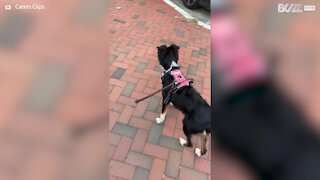 0:41
0:41
Buzzvideos - EN
5 years agoDog howls like ambulance siren
1401 -
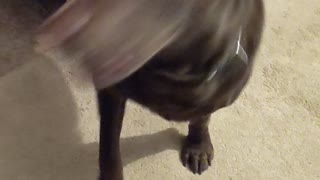 0:47
0:47
Heather7Light
4 years agoDog howls at shofar
262 -
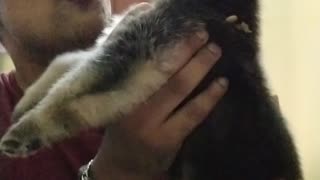 0:22
0:22
ViralHog
4 years ago $0.03 earnedGerman Shepherd Puppy Howls Back to Owner
4341 -
 0:58
0:58
ViralHog
4 years ago $0.03 earnedDog and Owner Playfully Bout
307 -
 2:07
2:07
KJRH
5 years agoDog Reunited With Owner
30.6K1 -
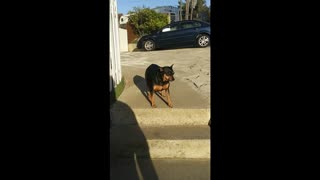 0:54
0:54
Mwanyumba
4 years agoCute Dog Tries To Tell Her Owner That Its Too Hot, Hillarious
29 -
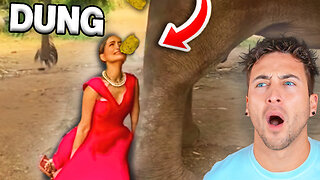 2:53:01
2:53:01
Nikko Ortiz
5 hours agoNew Army Machine Gun In Insurgency Sandstorm... |Rumble Live
17.8K1 -
 5:01:07
5:01:07
ZWOGs
6 hours ago🔴LIVE IN 1440p! - TOURNAMENT DAY! The Brrrap Pack & Myself vs Sparksforce! - Come Hang Out!
5.68K -
 LIVE
LIVE
StevieTLIVE
4 hours agoBig Daddy Stevie Cookin' Warzone DEEP in to the LATE Night
7 watching